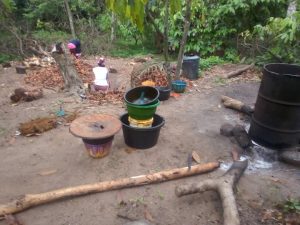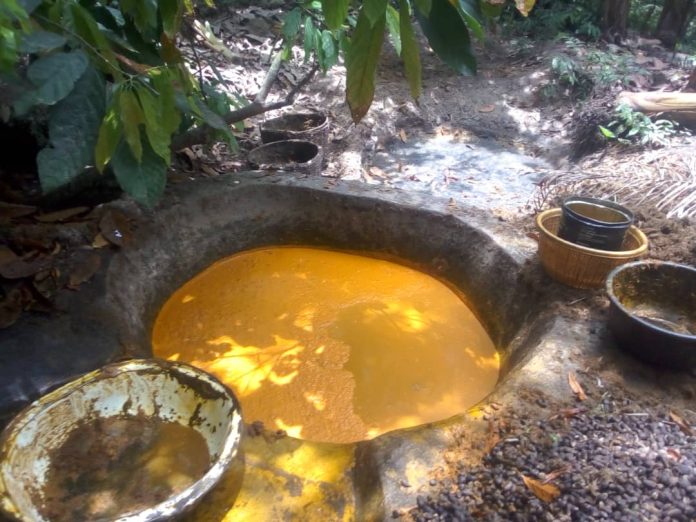Cecilia Ojewuyi has spent her life tending to the palm trees of Joriki village in Igbajo, Osun State. But now, at 45, she helplessly watches how her once-thriving farm withers away amid the Nigerian economic crisis.
The cause? skyrocketing prices plagued by the removal of fuel subsidy; a burden too heavy for her business to bear.
“The high cost of goods profoundly affects my business due to the removal of the fuel subsidy. Palm trees no longer yield as much harvest as they used to, and the demand for palm oil has dwindled,” she told The Harbinger.
With a voice trembling from years of dedication and hard work, Cecilia faces the harsh reality of livelihood on the edge of her business collapse.
Cecilia’s story is a harrowing tale of resilience in the face of relentless adversity, pushing her to speak with a sense of desperation, “We are just managing, praying for divine assistance to see us through.”
Government Regulation Lay A Storm On Citizens’ Livelihood
At the gripping moment of his inauguration speech on May 29th in Abuja, Nigeria’s new president, Bola Ahmed Tinubu, departed from the script to make a significant announcement: “Fuel subsidy is gone.” His unscripted declaration sent shockwaves through the nation, prompting citizens to rush to petrol stations in droves, creating long queues as they sought to secure one last affordable drop of fuel before the subsidy disappeared completely.
Unfortunately, the value of the Nigerian naira experienced a drastic decline in 2023, plummeting by 96.55% against the US dollar in the official market. At the close of trading for the year, the exchange rate reached N907.11 per dollar, compared to N461.61 at the end of 2022.
This depreciation reflected a significant loss in value, with the naira now hovering between N950 and N1000 against the dollar in official markets.
Meanwhile, these developments have ushered the nation into an era of unforeseen challenges, marked by soaring prices across all sectors of the economy.
The removal of fuel subsidies and the surge of the dollar’s value have intensified inflationary pressures, significantly affecting Nigerian businesses; rising input and output prices, coupled with increased uncertainty, have disrupted business operations across sectors.
The removal has led to higher transportation and production costs, while the depreciation of the naira against the dollar has inflated import costs, which led to the challenges that forced businesses to adjust their price strategies and operational models to remain viable in the face of mounting inflation.
As the currency weakens, businesses grapple with rising inflation, increased production costs, and potential job losses of many citizens.
Similarly, according to the Nigerian Association of Chambers of Commerce, Industry, Mines, and Agriculture (NACCIMA), the federal government’s planned removal of the subsidy on Premium Motor Spirit (PMS), also known as petrol, could result in the shutdown of businesses, particularly small and medium-sized enterprises (SMEs).
SMEs are the backbone of Nigeria’s economy, contributing significantly to job creation, innovation, and economic growth of the country to a global standard.
However, subsidy removal measures often place SMEs at the forefront of the resulting changes and these oil producers are not exempted, battling the ripple effects of the removal.
Several Oil Producers Lament Ordeal
Dishearteningly, Cecilia Ojewuyi is not alone in struggling to survive during the Nigerian economic downturn. Omotola Mary Iyabo, another oil producer, narrated a similar ordeal, highlighting the profound impact of the high cost of living on her business operations and livelihood.
“The high cost of living affects me deeply because it hampers my ability to invest in my business,” she told The Harbinger. Her voice is laden with concern “It significantly impacts my palm oil production enterprise because, after factoring in the expenses of labor, the profit margins diminish substantially. Moreover, the exorbitant transportation costs, amounting to 3000 naira for a round trip from Ada to Joriki, further erode any potential profits.”
Owolabi Iyabo, a seasoned palm oil producer, is also battling with her fair share, highlighting the financial strain caused by the current economic climate on her business. “The state of the market is dire, and we pray for divine intervention,” she told Harbinger, noting that labour costs leave little profit and the poor infrastructure road further exacerbates the situation, extolling significant transportation expenses.

In his case, Olawoye Samuel, a 40-year-old entrepreneur, echoed his concerns, pointing out how the cost of living and high fuel prices of the Tinubu administration swallow many potential profits.
“Every ounce of profit is swallowed up by the relentless rise in the cost of living,” he explains, emphasizing the broader impact on business operations and family well-being,” Olawoye bemoaned.
Infrastructure and Transportation Woes
The critical need for improved infrastructure is a common theme among producers. Iyabo underscores the necessity of well-maintained roads to reduce transportation costs, which heavily impact their earnings. “Until we have well-maintained roads, we will continue to bear the brunt of exorbitant transportation costs,” she asserts.
Samuel agreed to the reality that linking infrastructural improvements directs to business sustainability. “If fuel prices were to decrease and our roads repaired, life would become significantly easier for us,” he explained to Harbinger: stressing the importance of government intervention in infrastructure development.
Narrating his ordeal, Ogbeni Adetunji Ojo also highlighted the burden of transportation costs due to poor roads. “The escalating costs of labor and transportation weigh heavily on our operations,” he explained. Adding that high taxes have not translated into the expected infrastructure improvements in the country.
Iyabo remains steadfast in her commitment to overcoming obstacles, her determination serving as a beacon of hope for herself and her fellow producers. “Access to reliable transportation is essential for the sustainability of our businesses,” she emphasized.
Ojo and his peers have adapted their strategies to cope with high transportation costs by reducing market trips. “We’ve been forced to reduce our trips to the market due to the exorbitant transportation costs,” he revealed, showing their ability to adapt even in difficult circumstances.

Hardship in the Cost of Living, Producers Glorified Divine Intervention
The high cost of livelihood is significantly affecting both business operations and personal lives, as the situation is taking a toll on citizens.
Toyin Odurinde, 50, discussed the strain on her resources due to excessive transportation costs. In her words, “The high cost of living significantly affects my business operations.” adding that securing laborers has become increasingly challenging.
Samuel pointed out the broader implications on his family’s living conditions as the repercussions extend beyond their business, “they affect my family’s living conditions as well:” bemoaning the vulnerability to economic volatility.
Despite these economic hardships, producers remain resilient and look to faith for strength. Odurinde turns to God for guidance in navigating these difficult times. “In the face of these challenges, we turn to God for strength and guidance,” she explained her determination to persevere was evident.
Ojo reflected on the divine sustenance that helps him and his peers endure. “We thank and give glory to God for enabling us to persevere through these hardships,” he says, recognizing the difficulties inherent in palm oil production but trusting in God’s provision.
Call for help
Yet, amidst her trials, Cecilia extended a plea for collective aid, calling for state intervention. “But we also call on the government to lend us a helping hand. Repairing our bad roads would not be too much to ask for. Improved infrastructure would not only benefit us as producers but also facilitate the movement of goods and services throughout the community,” said Cecilia.
Iyabo emphasized the urgent need for government intervention to alleviate the burden placed on small-scale producers like herself and many others: urging the government to prioritize the repairing of their roads and bridges, as this would reduce the cost of transportation.
“The escalating cost of living has stifled business growth, and we yearn for a return to the thriving economic activity we once enjoyed,” Iyani implored; with her words echoing the sentiments of countless entrepreneurs grappling with similar hardships.
The Ripple Effect of Fuel Subsidy Removal- Expert
In an interview with The Harbinger, a Lecturer in the Department of Economics at Adekunle Ajasin University, Akungba-Akoko (AAUA), Mr. Ayeni David, sheds light on the far-reaching effects of the fuel subsidy removal in Nigeria.
According to Ayeni, the decision to remove the subsidy has had significant repercussions on both the economy and the daily lives of Nigerians. Explaining that subsidies are government measures designed to reduce the cost of essential commodities and services.
“Governments subsidize certain economic activities to lessen the burden. For subsidy to make sense, it should not be given on consumption but on production, on productive activities,” Ayeni stated.
He noted that the announcement of the subsidy removal had an immediate impact on fuel prices.
Ayeni recalled, “Immediately the statement was made, the market started reacting. The price of petroleum motor spirits shot up to about 430-440 Naira per liter, and subsequently even higher.”
This sudden price hike was a direct consequence of allowing market forces to dictate fuel prices.
Impact on Local Producers
Ayeni emphasized that the Nigerian economy heavily relies on fuel, impacting virtually all sectors, including agriculture, manufacturing, and services. He draws a vivid comparison: “What food is to the body, fuel is to the economy. Fuel provides energy to an economy.”
For local farmers, the cost of production has skyrocketed. The price of agricultural inputs, transportation, and machinery operations has increased dramatically. “If they have to plant Palm Kernel, they have to get palm kernel seedlings to plant them, and they don’t necessarily have the seedlings—they would have to buy them and take transportation to the farm,” Ayeni explained.
In light of these challenges, Ayeni advised the government to implement measures to mitigate the adverse effects of subsidy removal.
“This could include targeted support for the most affected sectors and exploring alternative energy sources to reduce dependency on fuel. For traders and local producers, he suggests adopting more efficient production methods and diversifying energy sources.” He noted.




